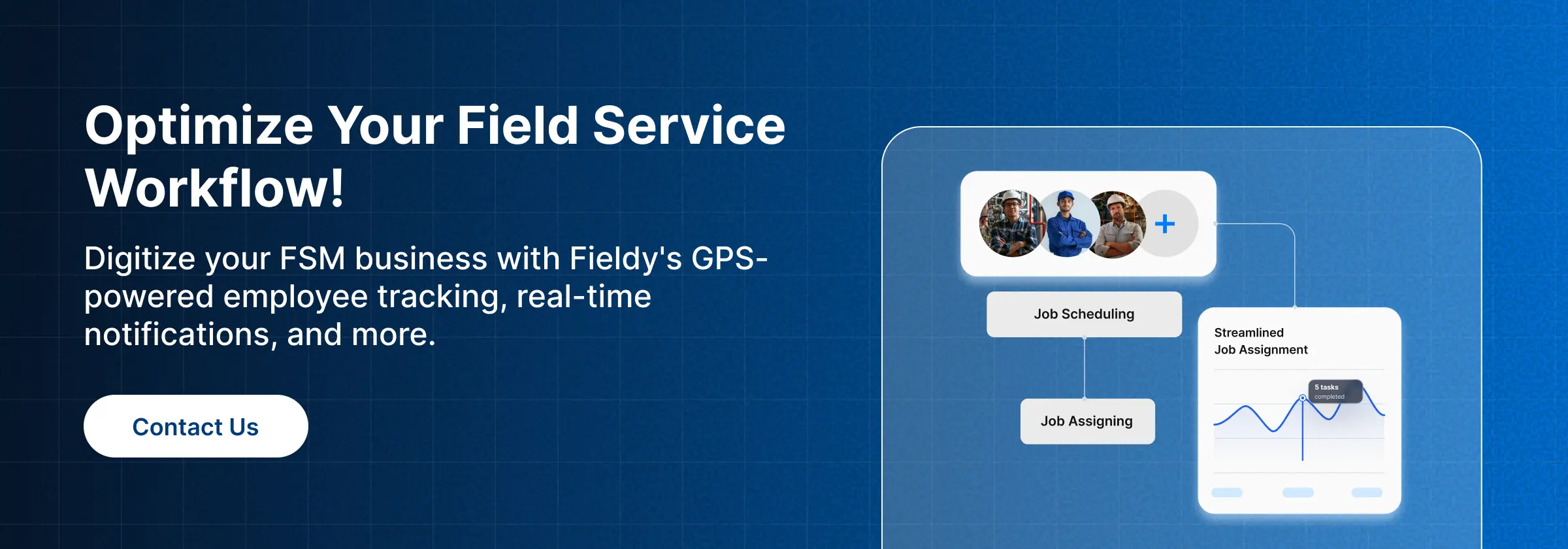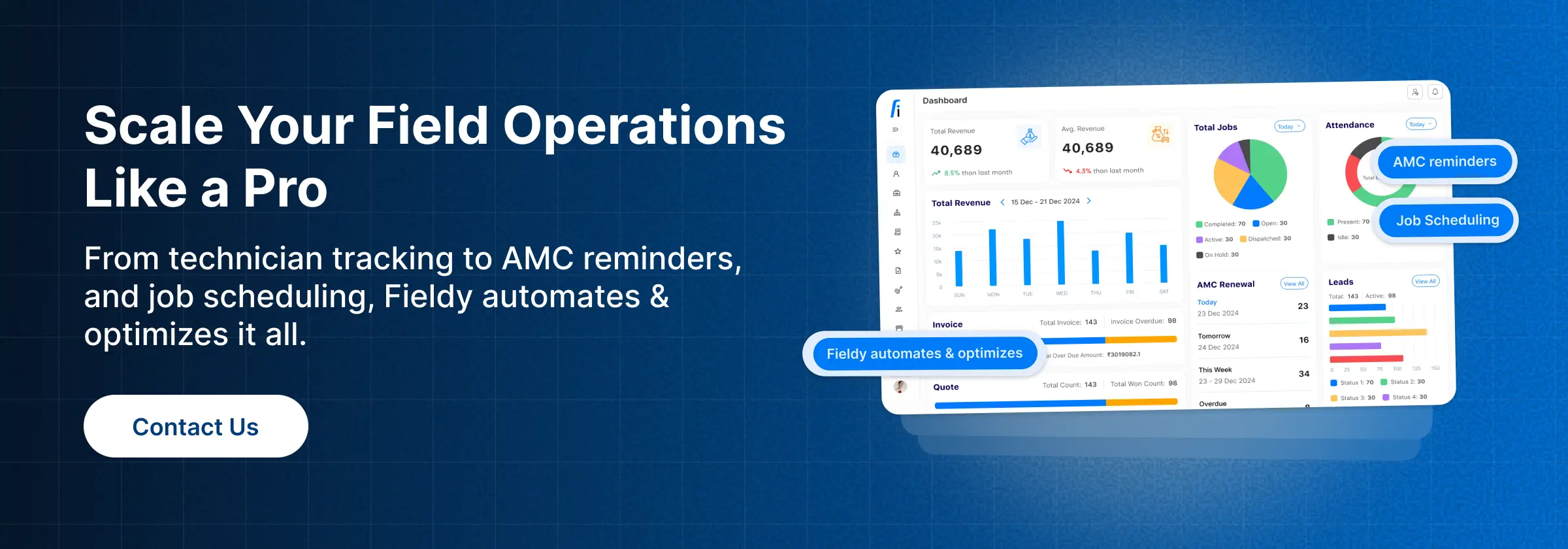🏁 Introduction
💬 Why Customer Service Experience Matters in Field Service
The essence of customer service experience (CSX) has become the root of the long-term success for different industries like HVAC, elevator maintenance, pest control, or building security. It is the interaction with a client that leads to keeping a customer or losing him to a competitor. Chances are that in 2026, the service landscape as we know it, based on the factors of price or product differentiation, will be a thing of the past; rather, it will be all about customer satisfaction and the level of their engagement with the company.
📊 Research Insights: Consumer research indicates that the dominant view of customer service or customer experience, regarding the value a brand gives its consumers, is one of the most critical factors in deciding whether to switch or keep the brand. Just one bad service or a late message can be the reason for customers losing faith in the brand after years.
It is easy today to identify platforms like Fieldy, which have played the role of catalysts for the change. They do so by bringing together all the administrative, communication, and planning activities that are related to field service, thus enabling businesses to offer a very user-friendly and open service, starting from customer booking and ending with the customer experience at the site. There is a complete shift of the business’s focus from task completion as soon as possible to creating an emotional bond through predictability and responsiveness.
🤔 What Is Customer Service Experience in Field Service Management (FSM)?
Differentiation in Field Service Management (FSM) lies in understanding the customer experience journey, covering every touchpoint from digital engagement to on-site service and after-service communication. It defines how customers feel throughout their interaction with a service provider.
🔹Key aspects of customer experience in FSM include:
- 🌐 Digital Engagement: Seamless booking, instant updates, and mobile accessibility.
- 🧰 On-Site Performance: Technician punctuality, professionalism, and communication quality.
- 💌 Post-Service Interaction: Feedback collection, service follow-ups, and personalized reminders.
🔸A clear distinction exists between customer service and customer experience:
- Customer Service focuses on resolving specific issues or answering queries.
- Customer Experience encompasses the entire relationship, from the first touchpoint to long-term trust.
🌟 Example:
If a technician simply repairs a faulty unit, that’s service. But if the technician arrives on time, greets the customer by name, and offers preventive maintenance tips, that’s a customer experience that builds loyalty.
Why it matters for field service companies:
- Customers today expect more than problem-solving; they want empathy, personalization, and efficiency.
- Companies that merge technology with human touch consistently outperform those that don’t.
Here’s where Fieldy’s Customer Experience Management Software stands out:
- Integrates CRM data, real-time tracking, and feedback systems into a single, easy-to-manage platform.
- Enables teams to understand customer behavior, improve communication, and deliver consistent service excellence.
This aligns perfectly with how modern field professionals operate, combining tech-driven efficiency with human empathy to ensure customers feel valued at every stage.
Moreover, these strategies connect directly with how to measure customer experience in FSM software, using metrics and feedback to continually evaluate and enhance service quality. 🔽🔽🔽
🧱 Key Elements That Define a Great Customer Service Experience in FSM
Delivering an exceptional customer experience requires alignment across several core pillars: transparency, speed, convenience, consistency, and feedback.
🔍 Transparency
Customers today value visibility above all. Providing real-time technician tracking, live job status, and proactive communication establishes confidence.
📈 Insight: For instance, when a pest control company offers live updates, customers are 40% less likely to cancel appointments or request rescheduling.
⚡ Speed
Service timeliness remains a crucial differentiator. Automated dispatching and route optimization ensure technicians arrive on schedule, reducing delays. Leveraging Fieldy’s field service scheduling software, companies can allocate the nearest available technician, boosting on-time arrivals and first-time fix rates.
🪄 Convenience
The modern customer expects frictionless access to services, whether booking an appointment, making a payment, or rescheduling a visit. FSM-integrated booking tools simplify this process, allowing 24/7 access and self-service convenience.
🔁 Consistency
Uniform service delivery builds credibility. Through standardized workflows and digital service records, businesses can guarantee the same quality experience, regardless of who performs the job.
💬 Feedback Loop
Post-service surveys and rating systems allow for constant improvement. By collecting structured feedback, FSM providers can detect weak areas and turn every service into a learning opportunity.
When integrated effectively, these five components illustrate what makes a great customer experience: a seamless, reliable, and personalized interaction that turns one-time customers into long-term advocates.
📅 How Field Service Online Booking Software Improves Customer Experience
The booking process often defines the customer’s first impression of your brand. Long waiting times or complex scheduling steps can cause frustration even before service begins.
Fieldy’s online booking software, part of its FSM ecosystem, eliminates this friction by enabling 24/7 appointment scheduling, instant confirmations, and automated reminders. Customers also benefit from reduced wait times, as bookings sync directly with technician calendars.
🧾 Case Study:
A practical example comes from an HVAC firm that integrated Fieldy’s booking module. Within six months, it saw a 30% increase in repeat appointments and a noticeable drop in cancellations. The convenience of instant booking and consistent reminders made a lasting impression on their customers.
Beyond convenience, online booking delivers valuable insights, like peak demand trends, booking-to-service ratios, and effort scores, helping optimize technician schedules. FSM companies using the best booking software can anticipate customer needs, balance workloads, and streamline operations for higher satisfaction and efficiency.
💡 Using Customer Experience Management Software to Build Loyalty
Building loyalty in field service depends on how well a company anticipates needs rather than reacts to issues. That’s where customer experience management (CXM) software reshapes engagement.
With centralized data and automation, FSM businesses can deliver proactive and personalized service. Fieldy’s CX tools, for example, help companies:
- Maintain a unified customer database containing preferences, service history, and prior feedback.
- Send automated AMC or maintenance reminders to ensure ongoing touchpoints.
- Provide live technician tracking for transparency and reduced wait anxiety.
- Track team performance to ensure consistent service standards.
🧾 Case Study:
An elevator maintenance provider using Fieldy’s CX suite saw customer renewals increase by 27% and recurring complaints drop 40% within eight months, thanks to improved transparency and timely service. 🔽🔽🔽
These improvements also connect naturally to other FSM tools, such as lead management software, which bridges the gap between inquiries, active service, and follow-ups, creating a continuous, data-informed customer journey.
🔮 Future of Customer Service Experience in FSM — AI, Automation & Personalization
The global FSM software market is rapidly expanding, valued at around $5 billion in 2026 and projected to exceed $14 billion by 2035, growing steadily at 11–15% CAGR across regions. This surge highlights how automation and data intelligence are becoming vital to meeting rising customer expectations.
AI-driven predictive maintenance, automated scheduling, and chat-based support are revolutionizing field operations with real-time visibility and quicker resolutions. A cleaning company using Fieldy’s mobile FSM platform, for instance, achieved a 22% boost in first-time fix rates through better coordination and instant job data access.
📊 Insight: Moreover, about three-quarters of field workers report rising customer expectations and a demand for personalized service, something Fieldy’s AI tools address through predictive insights, service history, and communication logs that help technicians deliver empathetic, tailored experiences.
In 2026 and beyond, the future of customer service experience in FSM will hinge on balancing automation with empathy, where technology streamlines service, and human connection sustains trust.
❓ FAQs
What is customer service experience in field service management?
Customer service experience (CSX) encompasses how customers perceive every interaction with a service provider, from booking to completion. It represents the overall satisfaction, communication quality, and trust established throughout the relationship.
How does FSM software improve customer communication?
FSM tools improve communication by sending real-time updates, enabling live technician tracking, and automating notifications, ensuring customers always know what’s happening.
What is the main difference between customer service and customer experience?
Customer service is task-focused, addressing specific issues, while customer experience covers the emotional and relational aspects that define long-term loyalty.




